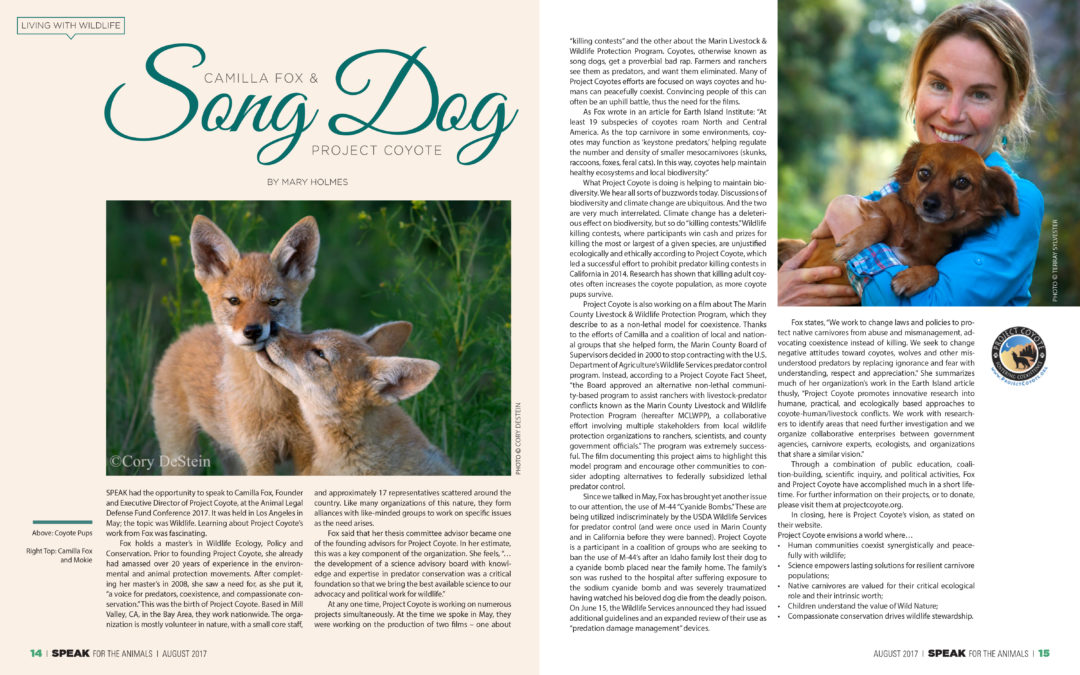SPEAK had the opportunity to speak to Camilla Fox, Founder and Executive Director of Project Coyote, at the Animal Legal Defense Fund Conference 2017. It was held in Los Angeles in May; the topic was Wildlife. Learning about Project Coyote’s work from Fox was fascinating.
Fox holds a master’s in Wildlife Ecology, Policy and Conservation. Prior to founding Project Coyote, she already had amassed over 20 years of experience in the environmental and animal protection movements. After completing her master’s in 2008, she saw a need for, as she put it, “a voice for predators, coexistence, and compassionate conservation.” This was the birth of Project Coyote. Based in Mill Valley, CA, in the Bay Area, they work nationwide. The organization is mostly volunteer in nature, with a small core staff, and approximately 17 representatives scattered around the country. Like many organizations of this nature, they form alliances with like-minded groups to work on specific issues as the need arises.
Fox said that her thesis committee advisor became one of the founding advisors for Project Coyote. In her estimate, this was a key component of the organization. She feels,”…the development of a science advisory board with knowledge and expertise in predator conservation was a critical foundation so that we bring the best available science to our advocacy and political work for wildlife.”
At any one time, Project Coyote is working on numerous projects simultaneously. At the time we spoke in May, they were working on the production of two films – one about “killing contests” and the other about the Marin Livestock & Wildlife Protection Program. Coyotes, otherwise known as song dogs, get a proverbial bad rap. Farmers and ranchers see them as predators, and want them eliminated. Many of Project Coyote’s efforts are focused on ways coyotes and humans can peacefully coexist. Convincing people of this can often be an uphill battle, thus the need for the films.
As Fox wrote in an article for Earth Island Institute: “At least 19 subspecies of coyotes roam North and Central America. As the top carnivore in some environments, coyotes may function as ‘keystone predators; helping regulate the number and density of smaller mesocarnivores (skunks, raccoons, foxes, feral cats). In this way, coyotes help maintain healthy ecosystems and local biodiversity.”
What Project Coyote is doing is helping to maintain biodiversity. We hear all sorts of buzz words today. Discussions of biodiversity and climate change are ubiquitous. And the two are very much interrelated. Climate change has a deleterious effect on biodiversity, but so do “killing contests.” Wildlife killing contests, where participants win cash and prizes for killing the most or largest of a given species, are unjustified ecologically and ethically according to Project Coyote, which led a successful effort to prohibit predator killing contests in California in 2014. Research has shown that killing adult coyotes often increases the coyote population, as more coyote pups survive.
Project Coyote is also working on a film about The Marin County Livestock & Wildlife Protection Program, which they describe to as a nonlethal model for coexistence. Thanks to the efforts of Camilla and a coalition of local and national groups that she helped form, the Marin County Board of Supervisors decided in 2000 to stop contracting with the U.S. Department of Agriculture’s Wildlife Services predator control program. Instead, according to a Project Coyote Fact Sheet, “the Board approved an alternative non-lethal community-based program to assist ranchers with livestock-predator confiicts known as the Marin County Livestock and Wildlife Protection Program (hereafter MCLWPP) a collaborative effort involving multiple stakeholders from local wildlife protection organizations to ranchers, scientists, and county government offidals.” The program was extremely successful. The film documenting this project aims to highlight this model program and encourage other communities to consider adopting alternatives to federally subsidized lethal predator control.
Since we talked in May, Fox has brought yet another issue to our attention, the use of M-44 “Cyanide Bombs.” These are being utilized indiscriminately by the USDA Wildlife Services for predator control (and were once used in Marin County and in California before they were banned). Project Coyote is a participant in a coalition of groups who are seeking to ban the use of M-44’s after an Idaho family lost their dog to a cyanide bomb placed near the family home. The family’s son was rushed to the hospital after suffering exposure to the sodium cyanide bomb and was severely traumatized having watched his beloved dog die from the deadly poison. On June 15, the Wildlife Services announced they had issued additional guidelines and an expanded review of their use as “predation damage management”devices.
Fox states, “We work to change laws and policies to protect native carnivores from abuse and mismanagement, advocating coexistence instead of killing. We seek to change negative attitudes toward coyotes, wolves and other misunderstood predators by replacing ignorance and fear with understanding, respect and appreciation.” She summarizes much of her organization’s work in the Earth Island article thusly, “Project Coyote promotes innovative research into humane, practical, and ecologically based approaches to coyote-human/livestock conflicts. We work with researchers to identify areas that need further investigation and we organize collaborative enterprises between government agencies, carnivore experts, ecologists, and organizations that share a similar vision.”
Through a combination of public education, coalition-building, scientific inquiry, and political activities, Fox and Project Coyote have accomplished much in a short life-time. For further information on their projects, or to donate, please visit them at projectcoyote.org.
In closing, here is Project Coyote’s vision, as stated on their website. Project Coyote envisions a world where…
Human communities coexist synergistically and peacefully with wildlife;
Science empowers lasting solutions for resilient carnivore populations;
Native carnivores are valued for their critical ecological role and their intrinsic worth;
Children understand the value of Wild Nature;
Compassionate conservation drives wildlife stewardship.
Download article here.

